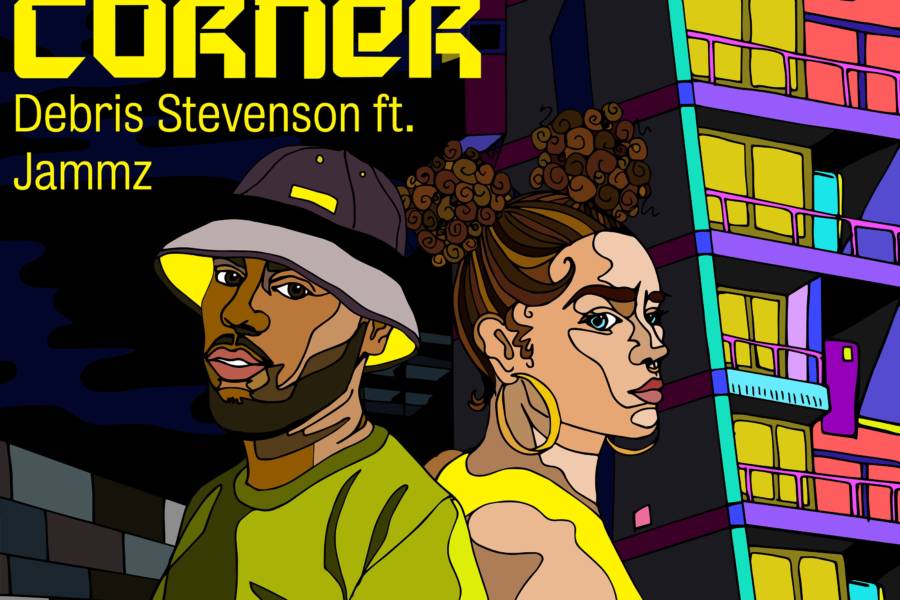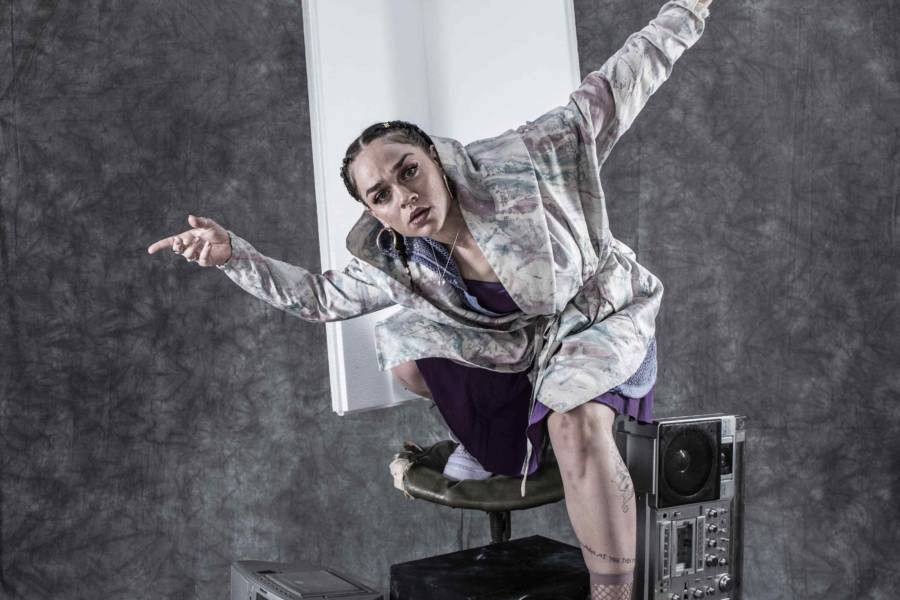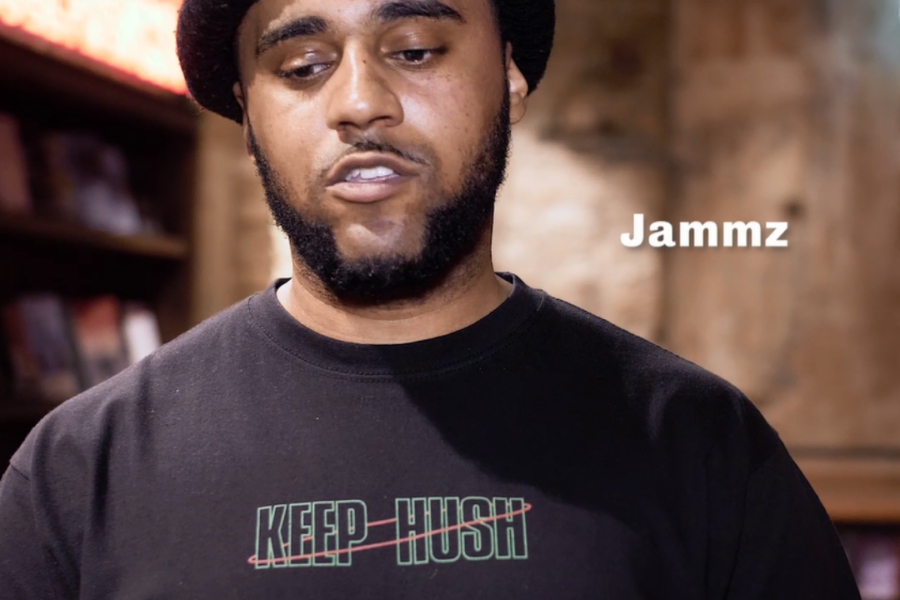Poet in da Corner: Semi-autobiography and storytelling
Published on Tue 18 Feb 2020‘In a strict Mormon household somewhere in the seam between East London and Essex, a girl is given Dizzee Rascal’s ground-breaking grime album Boy in da Corner by her best friend SS Vyper.’
In the second blog in our four-part series with Debris Stevenson and Jammz, we talk about the semi-autobiographical nature and lived experiences that are shared in Poet in da Corner.
How did you make sure you were giving space for different voices and journeys in Poet in da Corner?
Debris: A whole team really worked a lot on the storyline, with Jammz, with Ola Ince, with Benji who directed it in the earlier development stages, there was always a bigger understanding of the politics of the piece and what already exists. So we were really always very, very collaborative. It helps actually now that we found out that the character SS Vyper was mainly based on someone we both know, and he came to see the show, so that was really really good as well.
Jammz, how was it for you to meet him?
Jammz: I didn’t realise I knew him! So basically what happened was, during the first run, my cousin who I’m really close with, came to see the show. I saw him talking to this guy and Debris brings me over to him and she’s like, “that’s who SS Vyper is based on.” Anyway, it turns out that this guy has grown up with my cousin so they’re really close friends, and the way he felt about the piece and how accurately he felt that we had described what he was going through at the time felt so validating to me as a writer and as an actor.
Debris, in Poet in da Corner you talk about having dyslexia and how that has shaped your journey and your art?
D: I didn’t actually get diagnosed as dyslexic until I was 21 and it was described as the clearest case of dyslexia they had ever seen. I fought it for a long time. My type of dyslexia is an area called abstract symbols and sequencing, which means I don’t understand letters put in sentences with no context. Dyslexia is just the name of something, a way that your brain works that doesn’t fit the system. The system is made for like a very narrow set of things. I mean, the western system, the English system, is largely based on bureaucracy that is no longer relevant. There’s pressure on teachers that means they can’t teach in a way that is largely open to other ways of thinking. Ultimately, I am a poet because of my dyslexia. My poems are short. They’re concise. You can read them quickly, and never do abstract symbols and sequences have more meaning and context than in a poem. So, as soon as I started reading lyrics, as soon as I started hearing bars, everything made sense. Things that before made no sense made sense. I often say with every disruption, there’s an opportunity. It’s disruptive not learning like everyone else. So, I think yeah okay, the system is hard, but make your own system and you will learn to be a leader because of that. You will understand more about yourself, you’ll understand how you learn, and that is more important than memorising a series of facts.
Have your parents seen the show – what is their attitude to Poet in da Corner?
D: They haven’t seen the show, I’ll be honest about that. They’re aware of it. I’ve had counselling the whole way through this process, the same counsellor, and that’s been really important to me. I’ve been very careful with truth and fact. So, I try not to disclose any facts in the show that feel like they infringe on the privacy of any of my family members, but I try and make it true to my own experience. There was a point where I really wanted to bring my parents, then I kind of had a conversation with them about it, and I realised that the show isn’t church standard. So, my parents wouldn’t go see a movie with this content in it. For example, I haven’t actually officially come out to my parents before, although they are aware. I mean, I came into the house with a pride flag the same size as me once, but they just like carried on doing the ironing or whatever. You know, my parents didn’t surpass GCSEs, they didn’t grow up watching theatre. They’re brilliant, amazing people that work really fucking hard to raise three children against the odds. I’ve had a lot of breakthroughs with my parents through this process that the cast are very aware of, so I took them to see another one of my plays, and I just started talking to them about what I do.
I was a full-time poet from the time I was 20 and I remember telling my dad and he was like, “Shouldn’t you carry on waitressing?” My dad wanted to be a sports journalist and they just told him that will never happen, go to the post office and get a job, and he worked at the post office for like 40 years and then retired. My mum is brilliant and had the hardest life and has all the skills to stand on a stage like this, but had none of the opportunities. So, I really do feel like me standing here is me doing something for her. I think my responsibility, having shared the amount of our lives that I have shared, is to build a relationship with them that I can one day feel comfortable with. I had my first conversation with them the other day where I started telling them bits about the show and my mum asked “Is there any facts about me?” and I was like no, but explained that I put the colander story in – which is actually something my grandfather did. I told her that I put that story in the show as I knew she would think it was jokes, and she was actually getting excited about it for the first time. So that was, that was really nice.
Read the rest of the blog series: Part 1, Part 3, and Part 4.

Listen to Poet in da Corner
on Spotify.
Step into a technicolour world where music, dance and spoken word collide, and discover how grime allowed Debris Stevenson to redefine herself.
Listen to Poet in da Corner
Poet in da Corner on tour
Feb - Mar 2020
Poet in da Corner goes on tour to MAC Belfast, Leicester Curve, Birmingham Rep, Nottingham Playhouse, HOME Manchester, and Hackney Empire.
Find out more
Poet in da Corner | What can audiences expect
“Poet in da Corner will change your experience of theatre.”
Watch now